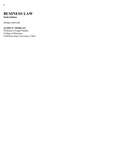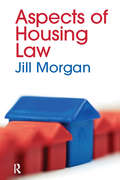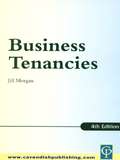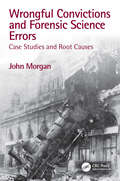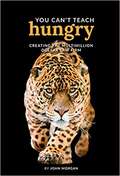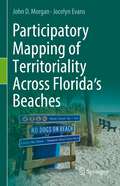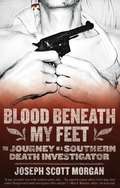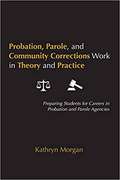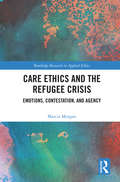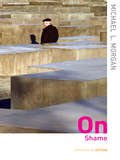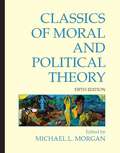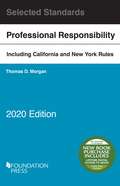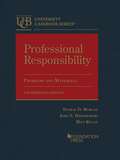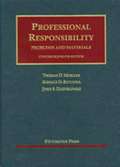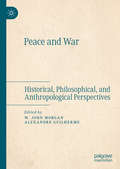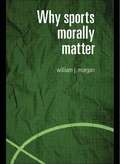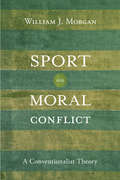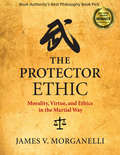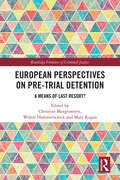- Table View
- List View
Business Law
by James F. MorganWe are excited to bring you the sixth edition of this book. The previous edition was used in business law and legal environment of business courses throughout the nation. The changes made in the sixth edition are geared to better meet the needs of instructors and students. <p><p> Four changes deserve specific mention: Latest Legislative and Administrative Developments: As you might expect, over the past few years, the law in the United States and within the international community has evolved, and exciting dimensions of the business/law dynamic have developed. This edition also captures the latest developments in legislative (e.g., the Defend Trade Secrets Act of 2016) and administrative fronts. Current Cases: The sixth edition includes recent U.S. Supreme Court decisions (several from 2017) as principal cases, along with new cases from other federal courts and various state courts. More Graphical Presentations: A host of new tables, exhibits, and other visual depictions of important concepts are included in this new edition. Reorganization of Uniform Commercial Code Materials: Recognizing that many law courses - particularly those aimed at accounting students - focus on the Uniform Commercial Code, the sixth edition presents Uniform Commercial Code (and related) chapters together. <p><p> We believe we have improved readability of this edition through a vigorous process of editing, in both content and grammar realms. The sixth edition continues our tradition of offering an expansive text that presents, in an interesting manner, the fascinating and ever-changing world of law within the business community. Welcome to the sixth edition!
Business Law 5th edition
by James F. MorganThe forty-six chapters in Business Law, fifth edition are divided into ten distinctive parts. These parts permit the reader to view chapters within a broader context as represented by the term chosen to describe the part. That is, this structure allows students to have a logical skeleton with which to see the "big picture" of business law, consisting of the major parts of the discipline along with specific chapters presented in each part of the text.
Aspects of Housing Law
by Jill MorganAspects of Housing Law provides a comprehensive, up-to-date and readable account of what is often regarded as a complex and technical area of the law. It is essential reading for students of housing law and those taking courses in housing studies.With comprehensive coverage of all areas covered in an undergraduate course on housing, this concise and clear text covers: homelessnessowner-occupationregulation of rentsrepairs and disrepairsuccession to tenanciesprivate rented sectorsocial housinganti-social behaviour.
Practice Notes on Business Tenancies
by Jill MorganThis book provides invaluable practical guidance to the grant, renewal, assignment and surrender of business leases. The procedures involved are explained clearly and concisely, with each constituent part of a commercial lease being examined, and useful hints given on drafting. The book covers key case law and legislation, the latest information concerning time limits and court fees, the VAT consequences for the letting of business premises, rent reviews and statutory renewals. The book also summarises and offers practical analysis of the Landlord and Tenant (Covenants) Act 1995.
Wrongful Convictions and Forensic Science Errors: Case Studies and Root Causes
by John MorganForensic Science Errors and Wrongful Convictions: Case Studies and Root Causes provides a rigorous and detailed examination of two key issues: the continuing problem of wrongful convictions and the role of forensic science in these miscarriages of justice. This comprehensive textbook covers the full breadth of the topic. It looks at each type of evidence, historical factors, system issues, organizational factors, and individual examiners. Forensic science errors may arise at any time from crime scene to courtroom. Probative evidence may be overlooked at the scene of a crime, or the chain of custody may be compromised. Police investigators may misuse or ignore forensic evidence. A poorly-trained examiner may not apply the accepted standards of the discipline or may make unsound interpretations that exceed the limits of generally accepted scientific knowledge. In the courtroom, the forensic scientist may testify outside the standards of the discipline or fail to present exculpatory results. Prosecutors may suppress or mischaracterize evidence, and judges may admit testimony that does not conform to rules of evidence. All too often, the accused will not be afforded an adequate defense—especially given the technical complexities of forensic evidence. These issues do not arise in a vacuum; they result from system issues that are discernable and can be ameliorated. Author John Morgan provides a thorough discussion of the policy, practice, and technical aspects of forensic science errors from a root-cause, scientific analysis perspective. Readers will learn to analyze common issues across cases and jurisdictions, perform basic root cause analysis, and develop systemic reforms. The reader is encouraged to assess cases and issues without regard to preconceived views or prejudicial language. As such, the book reinforces the need to obtain a clear understanding of errors to properly develop a set of effective scientific, procedural, and policy reforms to reduce wrongful convictions and improve forensic integrity and reliability. Written in a format and style accessible to a broad audience, Forensic Science Errors and Wrongful Convictions presents a thorough analysis across all of these issues, supported by detailed case studies and a clear understanding of the scientific basis of the forensic disciplines.
You Can't Teach Hungry: Creating The Mutlimillion-dollar Law Firm
by John MorganThis book is the ultimate guide to building the multimillion-dollar law firm. In You Can't Teach Hungry, John Morgan shares his secrets, laying out a chapter-by-chapter road map to a sustainable legal practice. Morgan takes you through his earliest life lessons and combines them with practical advice he's gained from twenty-eight years of experience practicing law. You will see the inside workings of his business strategies, marketing plans, and the tools that Morgan uses to evaluate his firm and staff. You Can't Teach Hungry guides you through the steps to take a thorough inventory that will allow you to make hard decisions to improve and grow your law firm. Morgan walks you through proven practice pointers covering employees, management, case handling, and advertising, recommending steps to best prepare for adverse eventualities-such as diversifying your practice and having contingency plans in place. This book forces you to ask the tough questions about yourself and your practice-and the answers will amaze and motivate you. If you are starting your own firm, or are a partner in a small firm, this book is a must read. You Can't Teach Hungry shows you how to grow your practice with easy to use tools and techniques. It will change your practice and change your life. Accompanying the book are downloadable forms and templates that Morgan recommends to help manage your law practice.m
Participatory Mapping of Territoriality Across Florida’s Beaches
by John D. Morgan Jocelyn EvansThis book offers a theoretical and practical exploration of the beach as space and places unique disciplinary lenses (Political Science and Geography). If we accept that what one possesses, one has a claim to, becoming property, then how that possession is enforced, socially, makes all the difference in defining what constitutes territoriality. Morgan and his colleagues have carried out various studies and applied various methods to study the developing coast of Florida. From these efforts, we compare the different regions of the State (e.g., Florida panhandle vs. South Florida) in terms of local beach culture and economics to unpack the topic of tension between beach property and access using firsthand accounts in many cases. This book approaches the complex topic of territoriality on Florida’s beaches from multiple perspectives but related methods involving time geography, a public space index, participatory mapping/cartography, and transboundary viewsheds. This analysis illustrates the fruitfulness of conceptualizations of property that are complex, multiplicative, and evolving. It calls for a recognition of human rights to the commons -- both now and in the future. And it highlights the constructed nature of public space - as a space that provides meaning through bodily performance and encounter. Approaches the complex topic of territoriality on Florida’s beaches from methods of participatory mapping/cartography and performance art.Offers a theoretical and practical exploration of the beach as space and place.Utilizes the lens of territoriality and field-based participant cartographic mapping to understand better how the developed shoreline is territorialized.
Contract Law Minimalism
by Jonathan MorganCommercial contract law is in every sense optional given the choice between legal systems and law and arbitration. Its 'doctrines' are in fact virtually all default rules. Contract Law Minimalism advances the thesis that commercial parties prefer a minimalist law that sets out to enforce what they have decided - but does nothing else. The limited capacity of the legal process is the key to this 'minimalist' stance. This book considers evidence that such minimalism is indeed what commercial parties choose to govern their transactions. It critically engages with alternative schools of thought, that call for active regulation of contracts to promote either economic efficiency or the trust and co-operation necessary for 'relational contracting'. The book also necessarily argues against the view that private law should be understood non-instrumentally (whether through promissory morality, corrective justice, taxonomic rationality, or otherwise). It sketches a restatement of English contract law in line with the thesis.
Blood Beneath My Feet
by Joseph Scott MorganHave you ever been locked in a cooler with piles of decomposing humans for so long that you had to shave all the hair off your body in order to get rid of the smell? Joseph Scott Morgan did. Have you ever lit a Marlboro from the ignited gas of a bloated dead man's belly? Joseph Scott Morgan has. Have you ever wept over a dead dog while not giving a shit about the dead owner laying next him? Morgan did. Were you named after a murder victim? Joseph Scott Morgan was. This isn't Hollywood fantasy--it's the true story of a boy born into the deprivations of a white trash trailer park who as an adult gets further involved in the desperate backdoor sagas of the "new South." No hot blondes here, just maggots, grief, and the truth about forensics and death investigation. Joseph Scott Morgan became a death investigator with the Jefferson Parish Coroner's Office in suburban New Orleans in 1987, the youngest medicolegal death investigator in the country. During the day, Morgan worked in the morgue, and at night investigated for the coroner. In 1992 Morgan became senior investigator with the Fulton County Medical Examiner's Office in Atlanta. Morgan is now a college professor at North Georgia College and State University, where he teaches a death investigation course based on the national standards which he helped develop. He and his family reside in the Blue Ridge Mountains of north Georgia.
Probation, Parole, and Community Corrections Work in Theory and Practice: Preparing Students for Careers in Probation and Parole Agencies
by Kathryn MorganProbation, Parole, and Community Corrections Work in Theory and Practice is a comprehensive examination of probation, parole, and other correctional practices that are alternatives to incarceration. The textbook covers important topics related to community corrections, including an overview of correctional programs used as alternatives to incarceration (probation, parole, home confinement, and electronic monitoring); the history and development of community correctional practices; current controversies; and legal issues affecting probation, parole, and community correctional practices. <P><P> Critical thinking questions in each chapter along with case studies and case scenarios reflect the book’s balanced approach to examining community corrections. The emphasis on developing problem solving, report writing, and critical thinking skills makes this book an excellent choice for students who desire to enter the field. Students completing a course using this book will have not only an understanding of the dynamic forces of community corrections but also the skill competence that prepares them for entry-level positions in community corrections agencies.
Care Ethics and the Refugee Crisis: Emotions, Contestation, and Agency (Routledge Research in Applied Ethics)
by Marcia MorganThis book advocates for the philosophical import of care in re-evaluating problems of humanitarianism in the context of the ongoing international refugee and forced migration situation. In doing so, it rethinks the human capacity to care about the suffering of distant others. At a time when emotional resources are running low, there is a need to recast what it means to care, with the aim of generating a productive movement against the rise of value fundamentalism globally—embraced in mantras of ‘good and evil’ and ‘us and them’—and to confront xenophobia and oppressive politics. The author draws upon a wide array of rich traditions, including historical and contemporary writings on self-care and care of the other, to re-examine the intersection of care ethics and justice. She also rethinks the relationship between care and contestation, here analyzed in the aesthetic, ethical, political, and religious domains of human experience. From within the context of this contingent historical repetition of political oppression, the book constructs a reminder not only of what it feels like to care, but how and why we should act upon our care. Care Ethics and the Refugee Crisis is an important contribution to the growing literatures on care ethics and immigration/forced migration in philosophy. It will also appeal to scholars and advanced students working in other disciplines such as political science, refugee and migration studies, and social anthropology.
On Shame (Thinking in Action)
by Michael MorganShame is one of a family of self-conscious emotions that includes embarrassment, guilt, disgrace, and humiliation. On Shame examines this emotion psychologically and philosophically, in order to show how it can be a galvanizing force for moral action against the violence and atrocity that characterize the world we live in. Michael L. Morgan argues that because shame is global in its sense of the self, the moral failures of all groups in which we are a member – including the entire human race – reflect on each person individually. Drawing on historical and current affairs to explore the emotion of shame, as well as films such as Night and Fog, Hotel Rwanda and Life is Beautiful and the work of Primo Levi, Bernard Williams, and Stanley Cavell, Michael Morgan illustrates how moral responsibility can be facilitated by calling upon an emotional reaction that is familiar, complex, and central to our conception of ourselves as individuals and as members of society.
Classics of Moral and Political Theory
by Michael L. MorganThe fifth edition of Michael L. Morgan's Classics of Moral and Political Theory broadens the scope and increases the versatility of this landmark anthology by offering new selections from Aristotle's Politics, Aquinas' Disputed Questions on Virtue and Treatise on Law, as well as the entirety of Locke's Letter Concerning Toleration, Kant's To Perpetual Peace, and Nietzsche's On the Advantage and Disadvantage of History for Life.
Images of Organization: 30th Anniversary Edition
by Professor Gareth MorganSince its first publication over twenty years ago, Images of Organization has become a classic in the canon of management literature. The book is based on a very simple premise—that all theories of organization and management are based on implicit images or metaphors that stretch our imagination in a way that can create powerful insights, but at the risk of distortion. Gareth Morgan provides a rich and comprehensive resource for exploring the complexity of modern organizations internationally, translating leading-edge theory into leading-edge practice.
Images of Organization: 30th Anniversary Edition
by Professor Gareth MorganSince its first publication over twenty years ago, Images of Organization has become a classic in the canon of management literature. The book is based on a very simple premise—that all theories of organization and management are based on implicit images or metaphors that stretch our imagination in a way that can create powerful insights, but at the risk of distortion. Gareth Morgan provides a rich and comprehensive resource for exploring the complexity of modern organizations internationally, translating leading-edge theory into leading-edge practice.
Popular Morality in the Early Roman Empire
by Teresa MorganMorality is one of the fundamental structures of any society, enabling complex groups to form, negotiate their internal differences and persist through time. In the first book-length study of Roman popular morality, Dr Morgan argues that we can recover much of the moral thinking of people across the Empire. Her study draws on proverbs, fables, exemplary stories and gnomic quotations, to explore how morality worked as a system for Roman society as a whole and in individual lives. She examines the range of ideas and practices and their relative importance, as well as questions of authority and the relationship with high philosophy and the ethical vocabulary of documents and inscriptions. The Roman Empire incorporated numerous overlapping groups, whose ideas varied according to social status, geography, gender and many other factors. Nevertheless it could and did hold together as an ethical community, which was a significant factor in its socio-political success.
Model Rules of Professional Conduct and Other Selected Standards: Including California and New York Rules on Professional Responsibility (Selected Statutes Series)
by Thomas D. MorganSelected Standards on Professional Responsibility discusses one of the most dynamic fields in American law. Containing the ABA Model Rules of Professional Conduct, as well as New York and California standards on professional responsibility, this volume collects the most up-to-date and important standards that govern judicial and legal ethics.
Professional Responsibility: Problems and Materials (University Casebook Series)
by Thomas Morgan John Dzienkowski Mitt ReganThe 14th Edition of Professional Responsibility: Problems and Materials continues the traditions that have made this book a leader in its field for over 45 years. Built around problems, the book asks students to think about how they should behave in challenging, concrete settings. <p><p> The 14th Edition remains flexible enough to use in an overview course and challenging enough to use in ethics courses focused on particular areas of practice. It comprehensively addresses the ABA Model Rules of Professional Conduct, but also deals with additional issues raised in the Restatement (Third): The Law Governing Lawyers and in state rules that illustrate different ways to regulate lawyer conduct. <p><p> Perhaps most important, the 14th Edition keeps up with a rapidly-changing legal profession and with changes in lawyer regulation that respond to new developments. The book considers how the Covid-19 pandemic has changed the potential for virtual lawyer practice and increased tolerance of practice from outside a lawyer’s licensing jurisdiction. It examines the protection of confidential client information in a world where potential hackers threaten lawyer data and it introduces forms of litigation finance that may revolutionize how firms handle cases. It expands coverage of lawyer counseling and responds to issues of diversity, and it deals with Utah’s Regulatory Sandbox and Arizona’s rule changes that, even now, let regulators see new forms of practice take shape and assess the risks and benefits of the possible new future. <p><p> Since 1976, the authors of Professional Responsibility: Problems & Materials have helped students prepare to respond to professional challenges they will meet upon graduation, but also to understand how their profession and its challenges are changing. The new 14th Edition continues to meet those objectives.
Professional Responsibility, Problems and Materials
by Thomas Morgan John Dzienkowski Mitt ReganThe 14th Edition of Professional Responsibility: Problems & Materials continues the traditions that have made this book a leader in its field for over 45 years. Built around problems, the book asks students to think about how they should behave in challenging, concrete settings. <p><p> The 14th Edition remains flexible enough to use in an overview course and challenging enough to use in ethics courses focused on particular areas of practice. It comprehensively addresses the ABA Model Rules of Professional Conduct, but also deals with additional issues raised in the Restatement (Third): The Law Governing Lawyers and in state rules that illustrate different ways to regulate lawyer conduct. <p><p> Perhaps most important, the 14th Edition keeps up with a rapidly-changing legal profession and with changes in lawyer regulation that respond to new developments. The book considers how the Covid-19 pandemic has changed the potential for virtual lawyer practice and increased tolerance of practice from outside a lawyer’s licensing jurisdiction. It examines the protection of confidential client information in a world where potential hackers threaten lawyer data and it introduces forms of litigation finance that may revolutionize how firms handle cases. It expands coverage of lawyer counseling and responds to issues of diversity, and it deals with Utah’s Regulatory Sandbox and Arizona’s rule changes that, even now, let regulators see new forms of practice take shape and assess the risks and benefits of the possible new future. <p><p> Since 1976, the authors of Professional Responsibility: Problems & Materials have helped students prepare to respond to professional challenges they will meet upon graduation, but also to understand how their profession and its challenges are changing. The new 14th Edition continues to meet those objectives.
Professional Responsibility, Problems And Materials, Abridged (University Casebook)
by Thomas Morgan Ronald Rotunda John DzienkowskiContinuing the tradition that has made Morgan, Rotunda, and Dzienkowski's Problems & Materials on Professional Responsibility a leader in its field, this concise version of the casebook uses problems to provide an overview of lawyers' professional responsibility. One of the most rapidly changing fields in American law, professional responsibility sees new issues, rules, and cases each year. This condensed edition covers these topics in an abbreviated format. The concise coursebook is based on the 11th edition of Problems & Materials on Professional Responsibility, which has been the most widely-used Professional Responsibility coursebook and the leader in its field since its first edition in 1976, over 35 years ago. It focuses on the major issues of law governing the practice of law and the law of judicial disqualification, while shortening the volume of material and focusing on only the most essential topics.
Peace and War: Historical, Philosophical, and Anthropological Perspectives
by W. John Morgan Alexandre GuilhermePeace and War: Historical, Philosophical, and Anthropological Perspectives is an accessible, higher-level critical discussion of philosophical commentaries on the nature of peace and war. It introduces and analyses various philosophies of peace and war, and their continuing theoretical and practical relevance for peace studies and conflict resolution. Using a combination of both historical and contemporary philosophical perspectives, the book is at once eclectic in its approach and broad in its inquiry of these enduring phenomena of human existence.
Why Sports Morally Matter (Routledge Critical Studies in Sport)
by William MorganWhen we accept that advertisers and sponsors dictate athletic schedules, that success in sport is measured by revenue, that athletes’ loyalties lie with their commercial agents instead of teams and that game rules exist to be tested and broken in the pursuit of a win, what does our regard for sport say about the moral and political well-being of our society? Why Sports Morally Matter is a deeply critical examination of pressing ethical issues in sports – and in society as a whole. Exploring the broad historical context of modern America, William J. Morgan argues that the current state of sports is a powerful indictment of our wealth-driven society and hyper-individualistic way of life. Taking on critics from all sides of the political debate, Morgan makes the case that, despite the negating effect of free market values, sport still possesses important features that encourage social, moral and political values crucial to the flourishing of a democratic polity. It is this potential to transform society and the individual that makes sport a key battleground in the struggle for the moral soul of twenty-first century America.
Sport and Moral Conflict: A Conventionalist Theory
by William J. MorganWhat is the purpose of sport, and how are ethical conceptions of sport shaped by the answers to this question? In Sport and Moral Conflict, William Morgan investigates, examining sport as a moral crucible that puts athletes in competitive, emotionally charged situations where fairness and equality are contested alongside accomplishment. Morgan looks at the modern Olympics—from 1906 Athens to 1924 Paris, when the Games reached international prestige — in order to highlight the debate about athletic excellence and the amateur-professional divide. Whereas the Americans emphasized winning, the Europeans valued a love of the game. Morgan argues that the existing moral theories of sport—formalism and broad internalism (aka interpretivism), which rely on rules and general principles—fall short when confronted with such a dispute as the transition from amateur to professional sport. As such, he develops a theory of conventionalism, in which the norms at work in athletic communities determine how players should ethically acquit themselves. Presenting his case for an ethical theory of sport, Morgan provides insights regarding the moral controversies and crises that persist today.
The Protector Ethic: Morality, Virtue, and Ethics in the Martial Way
by James V. MorganelliDiscover how the martial way leads to a protector ethic The Protector Ethic is a deep dive exploring the principles and values that must anchor a modern warrior. The author is compelling, insightful, and not afraid of controversy. As the book begins, we are thrust into the true story of a robbery turned homicide. It happens midday on a train. The victim is twenty-four, and the murderer is eighteen. What unfolds is nothing short of horrific, yet the other passengers refuse to help. James V. Morganelli sees this as a symptom. When we are reluctant to defend ourselves, when we refuse to protect those around us, we become part of the disease. As a martial artist and ethicist, the author says martial arts are much more than technical exercises. They offer us a “physical philosophy”—one that allows us to understand ourselves, teaches us about others, and demonstrates the true meaning of justice. They help us make difficult moral decisions. Ultimately, isn’t this why we train? Readers will • Understand natural law, protective instinct, and self-risk. • Examine the martial way of valuing, reasoning, judging, and acting. • Discover how moral relativism, political correctness, and contrived social-justice campaigns do not make people equal. They can actually dehumanize us. • Recognize what it means to be an ethical warrior. Only the great books address philosophy for the contemporary warrior, which is why such titles as Zen in the Martial Arts, Living the Martial Way, and Meditations on Violence have become modern classics. The Protector Ethic is an indispensable contribution to this conversation. “Are you seeking ancient martial secrets?” Morganelli writes. “Here’s one. You already know how to defend yourself. A qualified instructor can run you through the basics, but that should take about ten minutes. After that, the serious work begins.” The martial way only lives when we treat it as something that can die.
European Perspectives on Pre-Trial Detention: A Means of Last Resort? (Routledge Frontiers of Criminal Justice)
by Christine Morgenstern Walter Hammerschick Mary RoganHigh levels of remand or pre-trial detention (PTD) is a matter of growing concern in many countries, and at a European level. Despite being responsible for a significant part of the prison population, PTD practice is rarely the focus of criminological and criminal justice research. This book examines pre-trial detention practices and different ways of reducing its use across Europe. Offering a range of country-specific studies, this book also offers comparative studies of major issues across the continent. In particular, this book illustrates and examines how the actors (judges, public prosecutors, defence lawyers) work in pre-trial proceedings and make decisions; the common challenges in PTD decision-making; the factors which explain higher and lower rates of PTD across Europe; similarities and differences in practice; and the ways in which cross-border cases within the European influence policy and practice. Offering suggestions and recommendations for how to bring down the use of PTD in Europe, this book is essential reading for all those engaged with European penal research and practice.
